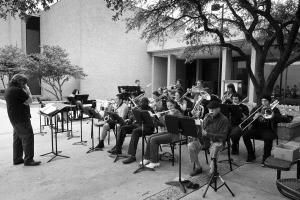By Ali Sabir
Good financial aid applicants are those who budget their money, pay their tuition and books up front and remain in their classes for the entire semester, the South financial aid director said recently.
Jolynn Sprole spoke to students about grants, loans and scholarships as options in securing assistance toward their pursuit of education during the Financial Aid for College Success seminar April 3 on South Campus.
“Financial aid is not hard. It might seem like it is. It is a lot of paperwork,” she said. “You have to stop and think. If it did not involve any paperwork, then everybody would be doing it, and all the money would be gone the first week.”
Attendance has a great effect on financial aid, Sprole said. Students who fail to attend classes could lose their government assistance, causing a recalculation of financial aid.

Another factor that affects financial aid is the starting index. If a class is dropped before another class starts, financial eligibility is at risk.
Scholarships should be applied for well before deadlines, Sprole said. A wide variety of scholarships are available for TCC students, such as the TCCD Stars of Tomorrow, Career in Automotive and Coca-Cola scholarships. For more information on those scholarships, students can visit www.tccd.edu/scholarships.
Grants are also available to assist students. Grants are aid that does not need to be paid back. Supplemental grant funding is limited to early applicants, Sprole said. Pell Grants are a federal entitlement program. Once unlimited, Pell Grants are now available for up to 12 full-time semesters.
Most financial aid requires students to complete the Free Application for Federal Student Aid. Sprole said it is beneficial for them to link their IRS records with FAFSA to “pull in your tax information.” For accuracy purposes, FAFSA recommends using IRS records and not the individual’s interpretation of adjusted gross income and taxes paid, she said.
WebAdvisor’s Electronic Funds Transfer feature may be replaced with a new resource to handle financial aid and any refunds from the college, Sprole said. The EFT program will offer direct deposit, debit cards, ATM access on campus and will allow students to open up a bank account and make deposits. It will also set up direct bill payment for financial aid. Sprole said the change is pending a vote by the board, but students should prepare themselves for such a change.
Those who take out maximum student loans should consider the long-term debt, Sprole said. College graduates could begin their careers owing up to $56,000 in student loans, she warned.
Sprole also discussed the work-study program, a federal and state program that provides students with jobs to help them earn money to pay for education expenses. At a workload of 19 hours per week, students are paid a minimum salary of $7.25 per hour.
Successful applicants should expect a tight schedule where classroom hours and work shifts would take place on the same campus, she said.
Financing a college education comes with much assistance through loans, grants, scholarships and work-study programs, Sprole said.
“Financial aid is a challenge, but grades matter, attendance matters and attitude matters,” she said.




























